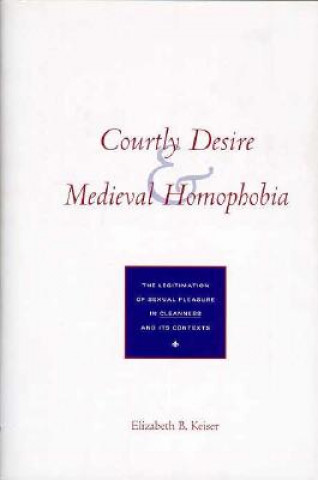
Dostawa
Doradca ds. zakupów
16 127 528 książek w 175 językach







Pokaż wszystkie języki (175)





Jednak się nie przyda? Nic nie szkodzi! U nas możesz zwrócić towar do 30 dni
 Bon prezentowy
O dowolnej wartości
Bon prezentowy
O dowolnej wartości
Bon prezentowy to zawsze dobry pomysł. Obdarowany może za bon prezentowy wybrać cokolwiek z naszej oferty.
Courtly Desire and Medieval Homophobia
 Angielski
Angielski
 225 b
225 b
30 dni na zwrot towaru
Mogłoby Cię także zainteresować


In the first comprehensive study of Cleanness and its medieval contexts, Elizabeth B. Keiser shows how this fourteenth-century religious poem legitimates erotic pleasure as natural apart from procreative justification and thus represents a unique moment in Western culture. She argues that Cleanness sacralizes heterosexual erotic play while condemning male homosexual love as profaning the Creator's workmanship and his nature. To situate the poem in the context of medieval homophobic constructions of nature as the basis of sexual norms, this book compares Cleanness's concepts of sexual desire and deviance with those its literary and theological antecedents, including Thomas Aquinas's discourse on temperance, Alain de Lille's Complaint of Nature, and Jean de Meun's Romance of the Rose. Cleanness is shown to be unconventionally affirmative of loveplay and other refinements of courtly artifice. Keiser explores the broad intellectual and social consequences of this celebration of late medieval masculine ideals and analyzes how the poet's class-specific aesthetic sensibility underlies a theologically and ethically flawed revisionist history of the biblical Creator's love affair with the creation. These limitations shed interesting light on Cleanness's relation to its theologically more complex and structurally more sophisticated companion poems - Patience, Sir Gawain and the Green Knight, and Pearl. This book is of groundbreaking importance for students of medieval literature and religion, the history of sexuality, queer studies, and gender studies.
Informacje o książce
 Angielski
Angielski
Kategoria




 Jak kupować
Jak kupować























